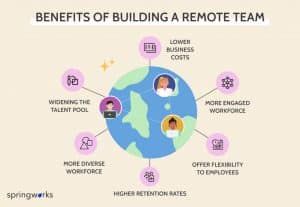The Remote Workforce
The rise of technology and the growing demand for flexible work arrangements have given rise to the remote workforce, a growing trend that is having a profound impact on the way businesses operate. For Caribbean businesses, the remote workforce presents both opportunities and challenges, including access to a wider pool of talent, flexible work arrangements, reduced overhead costs, and improved employee engagement and productivity. However, managing a remote workforce can be difficult, requiring new tools and processes to ensure that employees stay productive and engaged.
In this blog post, we’ll explore the rise of the remote workforce, its impact on Caribbean businesses, and the solutions that are available to help companies successfully manage their remote workforce.
The Rise of the Remote Workforce
The rise of the remote workforce is driven by several factors, including advancements in technology, a growing demand for flexible work arrangements, and a changing job market. Advances in technology have made it possible for employees to work from anywhere in the world, with access to the tools and resources they need to be productive. This has given rise to a new generation of workers who are not tied to a specific location, and who value the freedom and flexibility that comes with remote work.
At the same time, businesses are increasingly recognizing the benefits of remote work, including reduced overhead costs, access to a wider pool of talent, and improved employee engagement and productivity. This has led to a growing trend of companies adopting remote work policies, and a rise in the number of remote workers worldwide.
Impact of the Remote Workforce on Caribbean Businesses
For Caribbean businesses, the rise of the remote workforce presents both opportunities and challenges. On the one hand, it offers access to a wider pool of talent, flexible work arrangements, and the ability to reduce overhead costs. On the other hand, managing a remote workforce can be difficult, requiring new tools and processes to ensure that employees stay productive and engaged.
Some of the key challenges of managing a remote workforce in the Caribbean include:
- Communication: Ensuring that remote employees are kept in the loop and feel connected to the rest of the team can be a challenge.
- Collaboration: With employees working from different locations, it can be difficult to facilitate effective collaboration and teamwork.
- Trust and Accountability: Trusting remote employees to work independently and be accountable for their results can be a challenge for some managers.
Solutions for Managing the Remote Workforce
Fortunately, there are solutions available that can help Caribbean businesses successfully manage their remote workforce. Some of the key solutions include:
- Remote Workforce Management Tools: There are a variety of tools available to help companies manage their remote workforce, including project management tools, communication tools, and collaboration tools. These tools can help companies stay organized and keep track of their remote employees, while also facilitating communication and collaboration.
- Employee Engagement Programs: Employee engagement is key to ensuring that remote employees stay productive and engaged. Companies can implement programs and initiatives to keep remote employees engaged, such as regular check-ins, virtual team-building activities, and performance incentives.
- Training and Development Programs: Providing ongoing training and development opportunities for remote employees can help them stay productive and engaged. Companies can invest in online learning platforms and other training resources to help their remote employees grow and develop professionally.
- Performance Management Systems: Performance management is crucial for remote employees, who may not have the same level of direct supervision as on-site employees. Companies can implement performance management systems that allow them to track their remote employees’ progress,provide feedback, and set goals and expectations. This will help ensure that remote employees are held accountable for their results, and that they have a clear understanding of what is expected of them.
- Flexible Work Arrangements: Providing flexible work arrangements for remote employees can help keep them engaged and motivated. This can include options such as flexible scheduling, work-from-home policies, and remote work options.
- Strong Company Culture: Maintaining a strong company culture is key to ensuring that remote employees feel connected to the rest of the team. This can be achieved through regular virtual team-building activities, regular communication and check-ins, and clear expectations and values.
- Investment in Technology: Investing in technology is crucial for companies looking to manage their remote workforce. This includes investing in tools that support remote work, such as cloud-based systems and collaboration tools, as well as technology that supports employee engagement and productivity.
In conclusion, the remote workforce is a growing trend that is having a profound impact on Caribbean businesses. While it presents both opportunities and challenges, companies that are able to effectively manage their remote workforce can benefit from increased access to talent, reduced overhead costs, and improved employee engagement and productivity. By investing in technology, fostering a strong company culture, communicating regularly, and providing ongoing training and support, Caribbean businesses can successfully manage their remote workforce and take advantage of the opportunities it presents.
If you’re interested in adopting a remote work policy for your business, consider partnering with Caribbean HR Solutions. Our team of HR experts can help you implement the tools and processes necessary to successfully manage your remote workforce, and ensure that your employees stay productive and engaged. Contact us today to learn more about our remote workforce management solutions.






